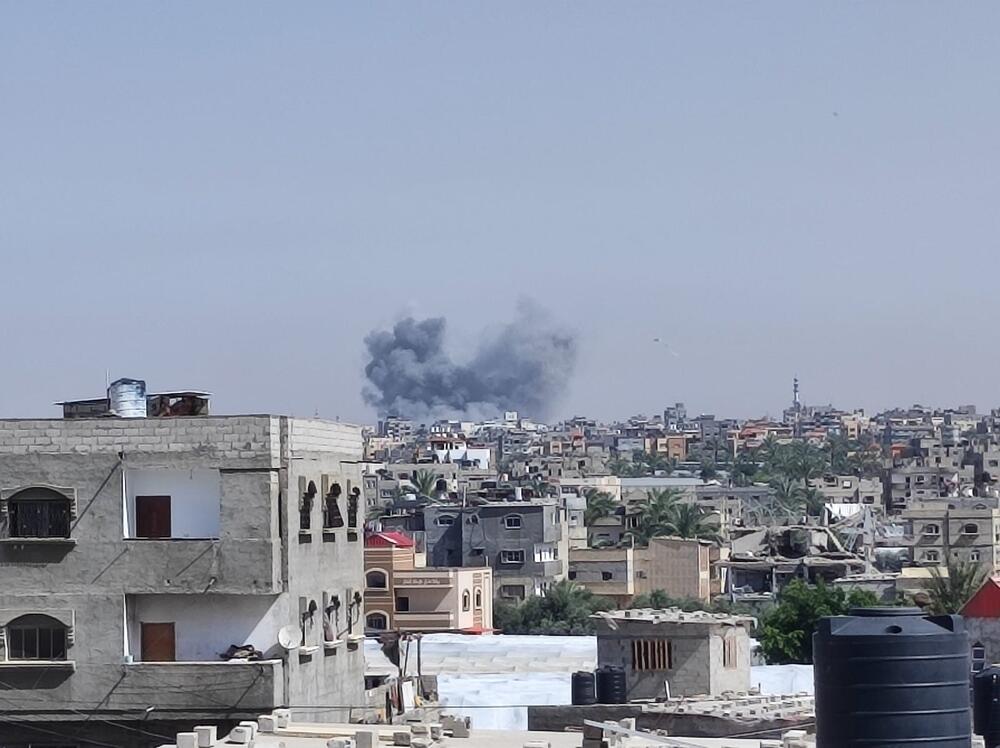Gaza: Thousands forced to flee as Israeli military offensive intensifies and aid is blocked in Rafah
Israeli forces have begun their offensive on Rafah and have seized control of the border, effectively cutting off lifesaving aid deliveries into the Gaza Strip.
As thousands of Palestinians are forced to flee eastern Rafah following Israel's recent evacuation orders, Médecins Sans Frontières / Doctors Without Borders (MSF) calls for protection of civilians and the reopening of the Rafah border crossing.
What is happening in Rafah?
On 6 May, Israeli forces ordered 100,000 people east of Rafah to evacuate to Al Mawasi, a zone between the west of Rafah and Khan Younis, where shelters and resources are also extremely scarce. Rafah was previously designated by the Israeli forces as a safe zone for civilians.
“These people are again forcibly displaced, moving from makeshift tents to another place without adequate shelter, food, water and medical care,” says Aurelie Godard, MSF Medical Team Leader. “They are at risk of falling further into a humanitarian disaster that has reached nightmare levels.”
What impact is the offensive having on healthcare in Rafah?
The offensive and the evacuation order further reduce access to healthcare in an already decimated health system, leaving people almost no options for even basic medical care.
Earlier this week, medical staff and patients had to be evacuated from Al-Najjar Hospital, while the European Gaza Hospital (EGH) is no longer accessible. Our teams have begun to discharge patients from Rafah Indonesian Field Hospital, where we supported the provision of post-operative care, and we are suspending our activities at Al-Shaboura Clinic until further notice.
“Having to suspend the activities of a health post where our teams carried out 8,269 consultations in April alone, is catastrophic,” says Paulo Milanesio, MSF Emergency Coordinator in Rafah. “Where are pregnant women, children, people with chronic diseases going to continue treatment?"
Is any aid getting into Gaza?
Rafah crossing, a vital humanitarian access point, has been closed completely until further notice.
"Assistance coming through this crossing was a lifeline for the whole Gaza Strip,” says Aurelie Godard, Medical Team Leader in Gaza.
The situation is chaotic and changing fast. Israeli authorities have announced the opening of the Kerem Shalom crossing, but due to the security situation, no aid has entered there.
The Erez crossing in the north of the Gaza Strip is open, and the supplies getting through there remain in the north, where they are desperately needed.
In the last three days, virtually no aid has entered Gaza, at a time when humanitarian needs are huge. Before the war an average of 500 trucks a day crossed through Rafah. Since the start of the war this has reduced to an average of 40. Now that number has now dropped to zero.
Currently, 1,700 trucks are blocked, lined up in Al Arish, Egypt, waiting to cross.
What does this mean for vital supplies, like fuel?
The closure of the crossing means that supplies of fuel are now running low. Hospitals, and other vital services including bakeries, phone networks, and even banks, rely on this fuel to power their generators. The World Health Organization (WHO) estimates that Gaza's hospitals have only a few days' worth left.
Vehicles including ambulances are also directly affected, and aid convoys to the north have already been paused (WHO). MSF teams have had to reduce distributions of drinking water because of a lack of fuel for the trucks.
Meanwhile, without fuel to power them, the water desalination plants are producing water in minimum quantities. If they stop altogether it will not be possible to get them working properly again.
As well as fuel shortages, our teams have testimonies of people in Rafah who are starting to run out of food, water and other essential items.
Are MSF staff able to get into Gaza?
We have colleagues working in Gaza, but our staff are not able to enter or exit the Gaza Strip at this time. This means we are not able to bring in new staff or supplies. This will soon create a lack of capacity and proper responses from our medical teams to the patients and to a population with only increasing needs.
What is MSF calling for?
Since the beginning of this war, MSF has seen a pattern of systematic attacks against medical facilities and civilian infrastructure. The health system in Gaza is being dismantled just as the needs are exploding, with devastating consequences for Palestinian people.
We reiterate our call for an immediate and sustained ceasefire to stop further death and destruction in Gaza and allow for lifesaving assistance to flow into the enclave.
MSF and the Gaza genocide
We are witnessing Israel commit genocide in Gaza.
MSF teams have seen firsthand the campaign of ethnic cleansing of Palestinians being pursued by the Israeli military in Gaza. The UK Government is complicit in these atrocities.
Our staff have worked to treat the wounded and supply overwhelmed hospitals as indiscriminate attacks and a state of siege threaten millions of men, women and children.
